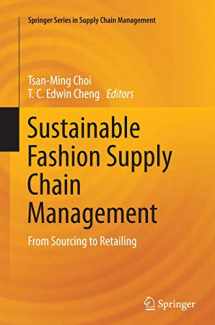
Sustainable Fashion Supply Chain Management: From Sourcing to Retailing (Springer Series in Supply Chain Management, 1)
Book details
Summary
Description
This handbook is a compilation of comprehensive reference sources that provide state-of-the-art findings on both theoretical and applied research on sustainable fashion supply chain management. It contains three parts, organized under the headings of “Reviews and Discussions,” “Analytical Research,” and “Empirical Research,” featuring peer-reviewed papers contributed by researchers from Asia, Europe, and the US. This book is the first to focus on sustainable supply chain management in the fashion industry and is therefore a pioneering text on this topic.
In the fashion industry, disposable fashion under the fast fashion concept has become a trend. In this trend, fashion supply chains must be highly responsive to market changes and able to produce fashion products in very small quantities to satisfy changing consumer needs. As a result, new styles will appear in the market within a very short time and fashion brands such as Zara can reduce the whole process cycle from conceptual design to a final ready-to-sell “well-produced and packaged” product on the retail sales floor within a few weeks. From the supply chain’s perspective, the fast fashion concept helps to match supply and demand and lowers inventory. Moreover, since many fast fashion companies, e.g., Zara, H&M, and Topshop, adopt a local sourcing approach and obtain supply from local manufacturers (to cut lead time), the corresponding carbon footprint is much reduced. Thus, this local sourcing scheme under fast fashion would enhance the level of environmental friendliness compared with the more traditional offshore sourcing. Furthermore, since the fashion supply chain is notorious for generating high volumes of pollutants, involving hazardous materials in the production processes, and producing products by companies with low social responsibility, new management principles and theories, especially those that take into account consumer behaviours and preferences, need to be developed to address many of these issues in order to achieve the goal of sustainable fashion supply chain management.
The topics covered include Reverse Logistics of US Carpet Recycling; Green Brand Strategies in the Fashion Industry; Impacts of Social Media on Consumers’ Disposals of Apparel; Fashion Supply Chain Network Competition with Eco-labelling; Reverse Logistics as a Sustainable Supply Chain Practice for the Fashion Industry; Apparel Manufacturers’ Path to World-class Corporate Social Responsibility; Sustainable Supply Chain Management in the Slow-Fashion Industry; Mass Market Second-hand Clothing Retail Operations in Hong Kong; Constraints and Drivers of Growth in the Ethical Fashion Sector: The case of France; and Effects of Used Garment Collection Programmes in Fast Fashion Brands.


We would LOVE it if you could help us and other readers by reviewing the book
Book review



